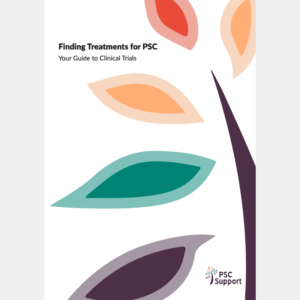ELMWOOD Clinical Trial Update
ELMWOOD Clinical Trial
New data
Positive results have been reported by the pharmaceutical company, IPSEN, following an interim review of the effectiveness of its study drug, elafibranor, in the open label extension of Phase II of the ELMWOOD trial. Elafibranor continued to be well tolerated by participants and showed improvement in medical markers of PSC, including measures of scarring in the liver.
Elafibranor
Elafibranor is a drug designed to target processes in the body that manage inflammation, scarring, and problems with bile flow (cholestasis).
Elafibranor is already an approved treatment for another liver condition called primary biliary cholangitis.
The ELMWOOD trial started with a 12-week Double Blind Period (DBP) where participants received either: elafibranor at two different doses; or a dummy drug called a placebo.
The results of this Phase II trial broadly showed that participants taking elafibranor experienced greater improvements in certain liver disease blood tests, more stability of their fibrosis markers, as well as reporting lower severity of itch. The benefit was more pronounced with those on the higher dose (120mg).
Nearly all participants who were eligible opted to continue with the drug on a 2-year Open Label Extension (OLE) where patients received 120mg of elafibranor daily.
Key Results of the ELMWOOD Trial (Interim Data)
Ipsen’s update reported on the data collected from the first 28 weeks of the open-label extension. It focused on safety, how the medicine affects the liver, and its impact on symptoms like itching.
Safety and Tolerability
Elafibranor 120 mg was well tolerated during the extension. The safety profile of the drug in the extension was similar to that seen in the initial DBP.
Of the small proportion of participants who experienced side effects, those included feeling sick (nausea), worsening itch, and weight increase.
Effectiveness in Reducing Liver Damage and Symptoms
It is promising that ongoing treatment with elafibranor showed sustained improvements in the following key measures of liver health:
Improvements in Bile Flow Markers
Overall, participants had a reduction in markers of bile flow problems (cholestasis). Participants who were already taking elafibranor in the DBP saw these improvements continue during the extension. Those who switched from the placebo to elafibranor for the extension also saw improvements in these liver markers.
Reductions in Scarring
The study used non-invasive tests (such as a Fibroscan) to measure liver scarring. Participants who continued elafibranor saw further reductions in these scarring markers. Those who switched from the placebo to elafibranor saw their scarring markers stabilise or even reduce.
Relief from Itching
All patient groups experienced reductions in the severity of their itch.
Next Steps for Elafibranor Research
The two year open label extension of this Phase II of the ELMWOOD trial is ongoing.
These interim results support the findings of the earlier 12 week study, and are particularly exciting in that they have shown potential to not only stabilise, but reverse some signs of liver damage.
Further research is needed across a larger PSC patient population, but these results are encouraging and we strongly support the continued development of elafibranor as a possible treatment for PSC.
Previous ELMWOOD announcements:
If you'd like to learn more about clinical trials, what's involved and what the various terms mean, order our free Clinical Trials Guide.

